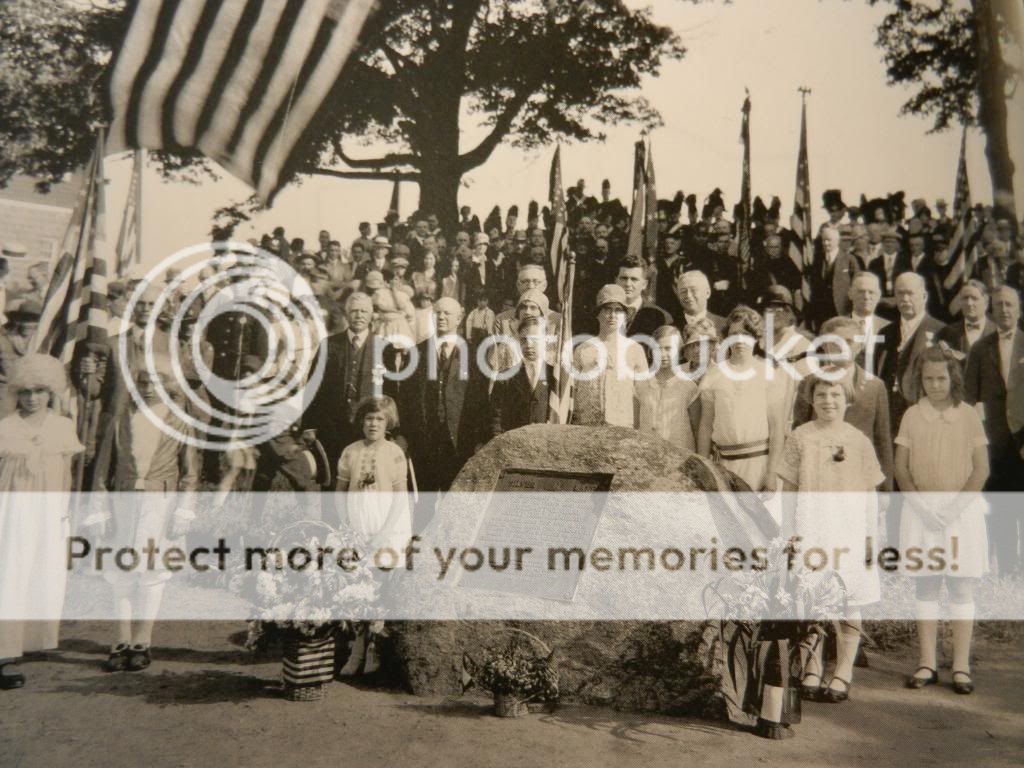(W3R) Washington Rochambeau Revolutionary Route, East Hartford,
Silver Lane Encampment #6 & #45

On June 17, 1928, East Hartford town residents unveil a bronze plaque boulder commemorating the French soldiers encamped here during the Revolutionary War en-route to assist George Washington’s Continental Army. A parade was held and many ceremonial speeches given, but the highlight that day was the East Hartford High-School's singing of the French National Anthem “La Marseillaise” in French.
Thousands of French Troops March Down
Silver Lane!
You will arrive at this historic Revolutionary War marker on what was once a pre-Colonial Indian trail. Native Americans blazed the first network of trails throughout this region, essential to early European settlers. The Podunk Indians lived here at the time English puritans led by Thomas Hooker arrived from Cambridge, MA in 1635, establishing the first permanent colonial settlement in Connecticut. The Puritans traveled along the most famous of these Native American trails, "Old Connecticut Path.”
In 1781 during the Revolutionary War, approximately 5800 French troops arrived under the Command of General comte de Rochambeau, marched through Connecticut to join General George Washington‘s Continental Army in Phillipsburg, New York. The armies continued on to Yorktown, Virginia, successfully defeating British General Charles Cornwallis. This defeat was viewed as a pivotal moment in American History and the first real acknowledgement of the 13 colonies’ sovereignty and new found nation status. In 1782, the returning victorious French troops once again marched through Silver Lane, the majority departing Boston on Christmas Eve for deployment to the West Indies.
The East Hartford encamped troops consisted of four regiments: Bourbonnais, Saintonge, Royal Deux-Ponts, and Sossonnais; the only regiment (nearly 1000 soldiers) to camp at this specific location on June 24-26, 1781, in the meadows south of Silver lane. The other regiments camped closer to the Connecticut River meadows. On the return trip, Oct 29 thru Nov 4, 1782, soldiers were encamped on both sides of Silver Lane. What makes the East Hartford encampments so unique? All four regiments marching a day apart from the other, consolidated here, allowing time for the artillery and baggage to arrive for the river crossing. These encampments created quite the spectacle for locals. A celebratory atmosphere ensued, with days of feasting and dancing with the locals.
Why the name Silver Lane? In the late 1700’s, imported kegs of French and Spanish silver coins stored at the Timothy Forbes house just down the road from here, were used to pay troops during the Revolutionary War, possibly attributing the name ‘Silver Lane’. It’s also said, a silversmith resided nearby, and the road named Silver Street seventeen years prior to the French arrival. Continental currency had lost most of its value during the War. The French Livre (replaced by the Franc in 1795) and Spanish Piasters sustained the war effort--a boon to the local economies as troops spent money freely for goods and services throughout their journey.
“The helpful kind of patriotism is the kind that grows out of knowledge of one’s town, of her growth, her people, her property, her government and needs. This knowledge develops first, an intelligent interest; then a sympathy, then a reasonable affection, a wise and temperate jealousy for her good name and a wish that she may prosper and grow more beautiful; and finally, a desire to help her to become greater and finer, a bright and clean workshop and a home for the best of men and women.”
Francis L. Paquet's favorite quote, written by John Cotton Dana